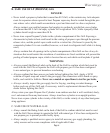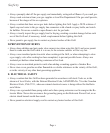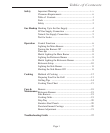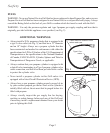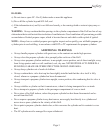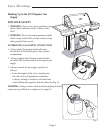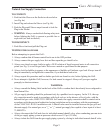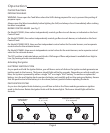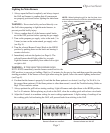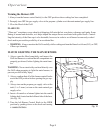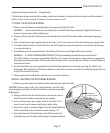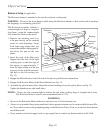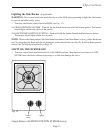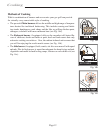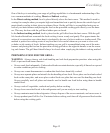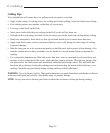Special offers from our partners!

Find Replacement BBQ Parts for 20,308 Models. Repair your BBQ today.

Lighting the Main Burners
1. Always open the Hood completely and always inspect
the Grill and burners to confirm that all components
are properly positioned before lighting the main burn-
ers.
WARNING:
Never stand with your head directly over
the Grill when preparing to light the main burners, to
prevent possible bodily injury.
2. Always confirm that all of the burner control knobs
are in the OFF position before opening the gas supply.
3. Turn on the propane gas supply valve at the tank (1 to
2 turns) or turn on the main natural gas supply valve
(see Fig. 8).
4. Turn the selected Burner Control Knob to the HIGH
position by pushing down on the knob and turning it
counter-clockwise.
5. Immediately activate the Igniter (see Page 6). The
selected burner should light within five seconds.
Light the burners sequentially from either left to right
or right to left.
WARNING: IF THE SELECTED BURNER DOES
NOT LIGHT, immediately turn the burner control knob to the
OFF position, to prevent gas buildup. Wait five (5) minutes for the gas to clear and then repeat the preceding
starting procedure. If the burner will not light when using the Igniter, follow the match lighting instructions
(see Page 8).
6. Confirm that the burner is properly lit and that the flame pattern is as desired, (see Figs. 9a, 9b & 9c, for
the proper flame patterns). If the flame pattern is other than normal, consult the Troubleshooting Guide on
Page 23 for corrective action.
7. Always preheat the grill before starting cooking. Light all burners and adjust them to the HIGH position
for 5 to 10 minutes. Before placing any food on the Grill, clean the cooking grids with a brass wire brush.
8. Adjust the Controls to a medium setting for most cooking requirements. A light coating of cooking oil on
the cooking grids, before heating the Grill, will prevent foods from sticking to the Grill.
NOTE: When lighting the grill for the first time, burn
with the main burners on HIGH for at least 30 minutes,
to burn off any manufacturing residues.
Fig. 8
Page 7
Operation
Fig. 9a Fig. 9b Fig. 9c
Normal: Soft blue flames
Out of Adjustment: Noisy, hard blue
flames indicate too much air
Poor Combustion: Wavy yellow
flames indicate too little air



